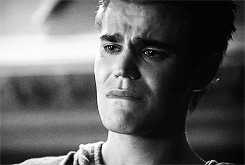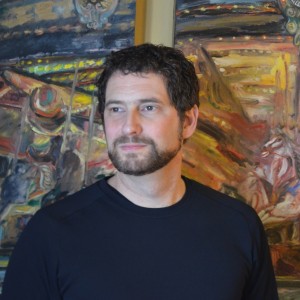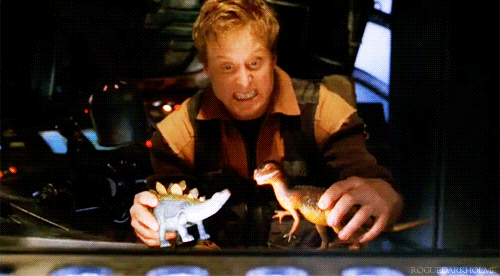Questions with: Kenneth Oppel
“No one had ever told me they loved me. (…) They were big words. I saw them rising from the horizon like the pillars and arches of an ancient civilization. (…) I craved those three words more than anything else.” (188)
This was the moment that broke my heart.

When I first heard about Every Hidden Thing, I was a bit apprehensive. Dinosaurs haven’t ever really been my thing, even as a child. What had been my thing were Kenneth Oppel novels. My parents, wanting to support Canadian lit, bought me as many of his books as they could get their hands on and so I grew up reading the adventures of Shade, Paul and Eric.
It was because of this that I bought Every Hidden Thing and started reading.
Two days later, I emerged, full of emotions and excitement. It was a better Romeo and Juliet! It had history! It had a female character who put her education first in a time where that wasn’t common! I was enthralled.
So when I ran into Kenneth Oppel at Toronto’s Word on the Street festival, I decided to ask him if he’d answer some questions for the blog. Despite his very busy fall schedule, he kindly obliged.
Without further ado…
Questions with Kenneth Oppel:
 Photo Credit: Mark Raynes Roberts
Photo Credit: Mark Raynes Roberts
What preparation went into writing this story?
I had a lot to learn for this book. I tried to bone up on anatomy so I could recognize joints and femurs and humerii. I spent a lot of time at the museum, measuring T-Rex’s and centrosaurs and pterosaurs. But I also wanted to know what it was like to swelter in the sun in search of fossils, and dig them up, so I managed to get myself invited on a short field expedition in Dinosaur Provincial Park in Alberta.
This was my Indiana Jones moment. I bought hiking boots, and a hat. The badlands terrain was a like an ancient hidden world, literally sunken below prairie level, a world of buttes and ravines and coulees and rocks of astonishingly different textures and colours. And mosquitoes, lots and lots of them. During my stay I got a crash course in prospecting, quarrying out fossils, and preparing them back in the lab. And I also got to ask my patient paleontologist hosts with questions about everything from the history of paleontology, to how to identify bone – something which I was useless at. I felt like a pesky cartoon character calling out every few seconds, “Don, hey, Don, is this bone?” A glance was all it took for him. “Nope. That’s glacial erratic limestone.” “Hey, Don, how about this?” “That’s petrified wood.” “Hey, Don, I think I’ve got something big here!” “That’s a rabbit skull. It’ll be a fossil in 65 million years.”

During my brief time in the Badlands, one of the amazing things I learned about paleontology was the work methods haven’t changed much in 140 years. You walk, you look, you dig, and when you find bone, you shovel. It can be tedious and sweaty, but exhilarating. During a day of prospecting, standing on a lookout, I asked my host: “If you had a machine that could see inside all these hills, would you do it?” He shook his head. “What would be the fun of that?”
There was a ton of other things I needed to learn about. The birth of American paleontology intersected with aggressive American westward expansion, and increasing tension with the American Indians prior to the Great Sioux War of 1876. I took pains to research the Lakota Indians whose homelands and way of life were being stolen and eradicated, and I was fortunate to have my manuscript reviewed in advance by a Lakota reader to make sure my depictions of the indigenous peoples of that area were accurate and respectful.
Every Hidden Thing has been compared to Romeo and Juliet [meets Indiana Jones]. Was that your intent when you began writing this story, or was that just a happy coincidence?
I wanted to write a revionist version of Romeo and Juliet, which I’ve always thought was not a very satisfying romance. The kids meet at a party, fall in love within seconds, and after that nothing changes between them. Their parents and society try to pull them apart, but these external forces are the only thing threatening their love. I believe in love at first sight, but I also think love evolves and faces challenges, and even requires dynamic change: a true romance involves people realizing they’re different, and perhaps not well-suited in all ways, yet they’re willing to accept those differences and love the other person nonetheless. So there’s a lot of friction between my two star-crossed lovers, Sam and Rachel.
You have been writing for over 20 years and have produced an impressive body of work. How do you keep your love for the craft alive? Do you have any advice for those trying to write, but struggling to do so?
My advice to young writers: don’t aim for perfection.
The first draft is the hardest. No matter how much brainstorming and blueprinting you’ve done, the fact is, you’re never fully prepared. You can’t really start knowing your characters and the world of the story until you start writing it sentence by sentence, and one line of dialogue after another.

Typically I get stuck fairly early on – and hate everything I’ve written. Kids should never feel bad about getting stuck. Getting stuck is natural. What I do is think about the story and the characters some more, and often go right back to the beginning and start afresh.
I don’t always work chronologically. More and more I jump around to wherever I think the best scene is – all over the place. If I’m stuck in one place, I go to another. This is very helpful at the beginning especially, since it helps you keep up momentum, and it may, jigsaw-like, make you realize what connecting scenes, before and after, you need to bind your story together.
But I try to piece together a complete rough draft this time and get to the end – or what I think is the end. The writing is sloppy, the characters are thin. There are huge plot holes. I try not to edit myself as I write. I try to write every sentence that comes to mind, even if it’s terrible.
Sometimes you have to write a lot of terrible sentences before the good ones come. And your best ideas will often come to you while you’re in the physical act of writing. The only mistake you can make is not writing.
-
Be sure to check out Kenneth Oppel’s Every Hidden Thing, out now.
